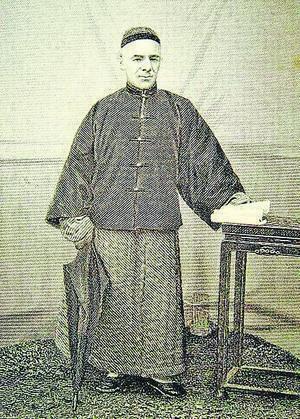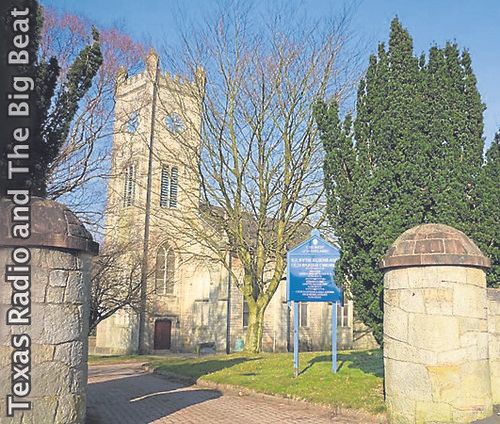
A missionary in China was once asked if he knew a fellow-missionary by the name of William Burns. ‘Know him, sir? All China knows him; he is the holiest man alive’.
Given that it is now 150 years since William Burns died, these words were spoken a long time ago. And certainly he has not been forgotten in the intervening period. But it is inevitable that to a growing number of Christians Burns should be a complete stranger, or, at best, a mere name. Inevitable, but regrettable; Burns for many reasons deserves still to be widely known.
Kilsyth
William Chalmers Burns was born in Dun, Angus, on 1 April 1815. His father was minister of the Dun Church of Scotland, later moving when his son was six to Kilsyth, Stirlingshire. It was in the Kilsyth church that William Burns would preach his first sermon. It was in the same church, a few months later, that he would have his first experience of revival.
An elder sister, reflecting on William’s teenage years, says that, ‘He was to our view the least likely subject of grace in the family’. Many years afterwards, however, Burns would write of how ‘in one moment … my inmost soul was in one instant pierced as with a dart.
‘God had apprehended me. I felt the conviction of my lost estate rushing through me with resistless power. I … retired to a bedroom, there to pour out my heart for the first time with many tears in a genuine, heart-rending cry for mercy’. He was 16 at the time.
One immediate result was a change of ambition. ‘In the same instant almost, I felt that I must leave my present occupation’ — he was preparing to study law — ‘and devote myself to Jesus in the ministry of that glorious gospel by which I had been saved’.
This conviction was later to take a definite shape. At Glasgow University, through the influence of the College Missionary Association, he became deeply burdened about the lost in other lands. It led to a consultation with the Church of Scotland’s India committee and an agreement, in principle, that he would go out as one of their missionaries.
Burns never wavered in his conviction that he should give himself to overseas missionary work. It was something to which, as his brother tells us, ‘he had solemnly, and as he deemed irrevocably, dedicated himself’. In two important respects, however, things turned out differently from what he had originally anticipated. One was that China rather than India became the sphere of his missionary service. The other was that fully nine years were to elapse before he was to begin.

Spiritual awakening
Why the delay? There were several reasons, but the most basic was this: Burns found himself in the midst of a great spiritual awakening in his own native Scotland. ‘While my views regarding missionary work remained unchanged’, he writes, ‘yet I found that I must for the time remain where I was, and fulfil the work which God was laying upon me with a mighty hand’.
It all began on Tuesday, 23 July 1839. Burns was 24 years old. He had been preaching over the weekend in his father’s church in Kilsyth and intimated that, before leaving, he would preach again on the Tuesday morning.
‘When I entered the pulpit’, he records, ‘I saw before me an immense multitude from the town and neighbourhood filling the seats, stairs, passages and porches … including many of the most abandoned of our population’.
His brother and future biographer Islay Burns was present. After describing William’s preaching, he says of the scene that followed: ‘I can think of no better description than the account of the day of Pentecost … of which both in its immediate features and in its after results, and in everything except the miraculous gift of tongues, it seems to me to have been an exact counterpart’.
It was necessary for Burns himself to leave after a few days. But the revival thus begun not only continued but deepened and spread. Many, both from Kilsyth and beyond, gave evidence over the long haul that it had truly been the time of their second birth.
Itinerant evangelism
From summer 1839 until summer 1847 Burns largely gave himself to itinerant evangelism. And not just in Scotland; extended periods of time were spent in Newcastle, Dublin and Canada. It is of his Scottish ministry, however, and particularly during the years 1839-1841, that the fullest details have been preserved.
Everywhere he went he was an instrument of revival. Whether it was in Dundee, Perth, Aberdeen or the Highlands, the same phenomena were witnessed: vast crowds, protracted meetings, deep conviction of sin, people sensing that they were face to face with eternal realities, multitudes of enquirers, a host of genuine conversions.
It is in connection with the revival in Dundee that Burns is perhaps best remembered today. For the first months after being licensed to preach he supplied the pulpit of St Peter’s, Dundee. Its well-known and deeply loved minister, Robert Murray M’Cheyne, was in Palestine at the time, making along with Andrew Bonar and two other Scottish ministers an on-the-spot investigation into the best place for a Scottish mission to the Jews.
It was to Dundee that Burns returned after the beginning of the revival in Kilsyth. And there, almost immediately, he ‘found himself in the midst of scenes essentially similar to, and scarcely less remarkable than those he had left behind’.
All through the years of itinerant evangelism the commitment to overseas mission was never forgotten. ‘He was still as much as ever … a missionary at heart, and only waited the intimation of the Master’s will as to the time and the place of his appointed work’.
At last it came and, on 9 June 1847, Burns set sail from Portsmouth, the first missionary to China of the English Presbyterian Church. On the day of his ordination he had been asked how soon he could be ready to leave. His answer? ‘Tomorrow’.

China
The fact that it was fully six months before his ship berthed at Hong Kong is a reminder of the challenges of international travel in those days. On board, Burns made a start to the formidable task of learning the Chinese language. Nor was it long after his arrival that he made his first efforts in using it for Christ. With three Chinese prisoners under sentence of death for murder he met almost daily, reading with them Chinese Christian books and praying with them.
For the next 20 years Burns gave himself, heart and soul, to the evangelising of the Chinese people. Many of the places where he worked were at or near the coast, but he always relished the opportunity to venture inland.
As these were still early days for the gospel in China, much of his ministry was to people who knew nothing at all of the good news. And often there was little fruit for his labour. During one seven-year period, for example, he did not see a single soul coming to the Saviour.
He felt keenly the total absence among the Chinese of any recognition of the Christian Sabbath and often lamented it in his correspondence. It contributed to the spiritual danger in which his work placed him. ‘Unless the Lord the Spirit continually uphold and quicken’, he writes, ‘Oh! how benumbing is daily contact with heathenism!’ It is for this reason that he constantly sought the prayers of others, not only for his work but for his own spiritual health.
Prayer
He was a man of prayer himself. ‘His whole life’, says Islay Burns, ‘was literally a life of prayer, and his whole ministry a series of battles fought at the mercy seat’. We see the same devotion in his attitude toward money and possessions. Apart from what was strictly necessary for himself, the whole of his income was given to the work.
On one occasion he gave a whole year’s salary to help the home church send out further labourers. When his trunk came home from China after his death, it contained so little that one child said in wonderment, ‘Surely he must have been very poor’.
When it comes to the actual results of his Chinese work we must not imagine that he saw no converts at all. Far from it. In one place, Pechuia, he even saw an awakening that reminded him of Kilsyth. A missionary colleague acknowledges, however, that ‘from the nature of the work for which he was specially qualified, and to which he entirely gave himself — that of a pioneer or evangelist — he could not expect to reap the fruits himself. His work was to break up the ground and sow the seed, not to gather the harvest’.
But William Chalmers Burns did more for his fellow missionaries than give them a harvest to reap. His greatest influence was in what he was himself. His devotion to prayer, his holiness of life, humility, generosity, passion for souls and dedication to the Chinese people made a deep and lasting impact on them — among them Hudson Taylor.
And on his converts? ‘They have been heard to say’, writes a contemporary, ‘that they got their idea of what the Saviour was on earth from the holy calm, and warm love, and earnest zeal of Mr Burns’ “walk with God”.’
He died at Port of Nieu-chwang, on 4 April 1868, after an illness of several months. His final words were, ‘For thine is the kingdom, and the power and the glory’.
David Campbell is pastor of North Preston Evangelical Church, UK, having previously served in pastorates in Darlington, UK, and Carlisle, PA.


